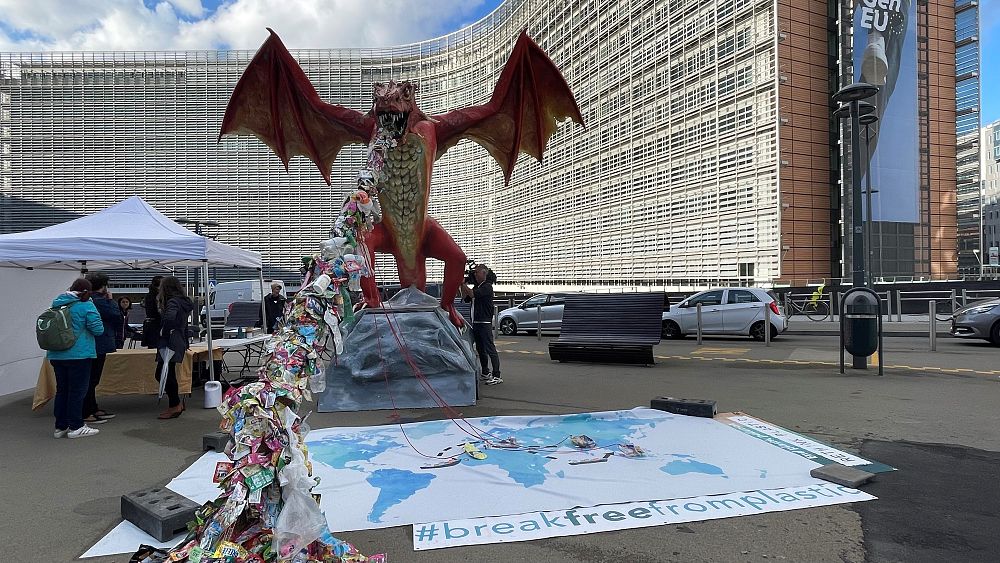
Humans have produced as much as ten billion tonnes of plastic to date, according to a new report looking at the scale and impact of plastic waste.
The Environmental Investigation Agency (EIA) has found that around six billion tonnes of this are either just sitting in landfill sites or polluting the environment.
The study also finds that over the past 65 years, plastic production on the planet has increased by 18,300%.
Part of the problem, the EIA says, is to do with plastic waste exports, arguing that the largest exporting countries, like Germany, Belgium, France and Italy, are overwhelming the plastic waste management infrastructure of destination countries as a result of not being able to manage their own production and consumption.
The EIA urges these countries to take responsibility by banning the export of plastic waste and reducing the amount of plastic they consume.
In Brussels on Wednesday, this is exactly what environmental activists and MEPs were calling for, using a four-metre-long plastic-spewing dragon set up outside the Berlaymont to call for a complete ban on the export of all European plastic waste to non-EU countries.
The event was organised by Zero Waste Europe and the Rethink Plastic Alliance, who handed over a manifesto laying out their demands to the European Commissioner for Environment, Oceans and Fisheries, Virginijus Sinkevičius, which includes bringing forward legislation banning all plastic waste exports to countries outside the EU.
Sara Matthieu, a Belgian MEP for the Greens/European Free Alliance group, told Euronews that the situation is so severe right now, that a ban is the only way forward.
“It’s a huge problem that today, coming from Europe, we are exporting our plastic waste to other [third] countries where we have no control over whether it is being recycled or just dumped,” Matthieu told Euronews.
“So, we’re using other countries as our waste dump and that’s really not ok. So, that’s why we need a ban on these exports of plastic because we can’t make sure that, at the moment, they’re really treated in the way they should be.”
In total, it was signed by 35 MEPs and more than 60 international environmentalist organisations.
Sinkevičius, who accepted the group’s manifesto, recognised that action is needed and told Euronews that new proposals can be expected soon.
“In the coming weeks we will put the most ambitious rules of exporting and trading waste in the whole world, I would say, so that it will be basically banned, unless it’s proven that the country receiving it really wants it and has the capacities to deal with it in a sustainable way,” the Commissioner said.
“We will also put additional pressure and responsibilities on the companies, so they have to take part and they have to prove that all the waste chain will be dealt with [properly].”
Speaking to Euronews, Emmanuel Katrakis, Secretary-General of the European Recycling Industries’ Confederation (EuRIC) said: “Restricting unprocessed plastic waste exports is important to prevent pollution, but alone won’t fix the problem unless strong measures are put in place to scale up plastic recycling infrastructure and boost the use of recycled plastics in a wide variety of products (such as packaging, cars, electronics, etc.). This will not only bring massive environmental benefits but also jobs in Europe.”
The Commission expects to bring forward proposals on banning plastic waste exports by November.










